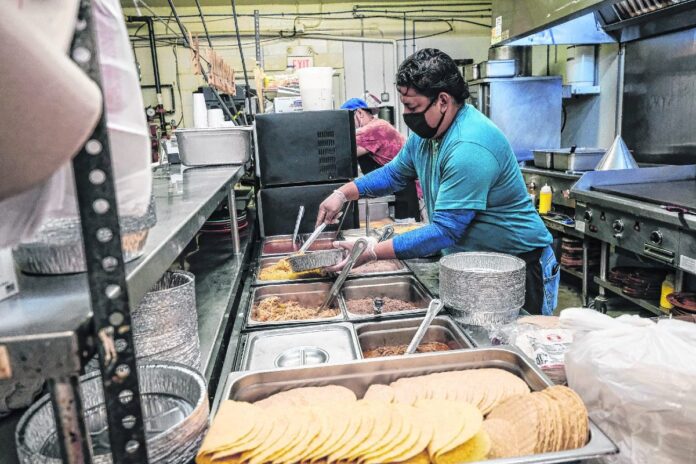
With COVID-19 infection numbers high and likely to continue rising, essential workers have a lot on their plate when it comes to helping patients. However, some of these employees are so busy that filling their actual plates during shifts can be an extra burden.
With that in mind, Columbus resident Courtney Imlay has organized a meal train for Columbus Regional Health employees.
The hospital has arranged a schedule for this week, through Sunday, so that meal donations will be divided evenly between its departments. This includes EMS workers, who will receive lunches and dinners on Sunday.
“Hopefully, by the end of the whole week, everybody in the hospital at least has gotten one meal or two, depending on where they are each day,” Imlay said.
[sc:text-divider text-divider-title=”Story continues below gallery” ]Click here to purchase photos from this gallery
The goal is to provide 30 lunches and 30 dinners for each day. Members of the community can sign up individually or in groups at mealtrain.com/w16e91 to give meals for the day shift or night shift on each day. The site also has a link for monetary donations, which go toward ordering meals for essential workers.
As of Tuesday afternoon, donations totaled $1,395, multiple community members had signed up to cover meal shifts, and only three meal shifts remained open for sign-ups. Imlay said that in addition to these two options, another way people can help is by simply spreading the word about the meal train.
Volunteers who sign up to “give” meals should note that each delivery should have 30 meals. In addition, all meals should come from a commercial kitchen and be individually packaged. In most cases, this means ordering the food from a restaurant, Imlay said, unless a resident happens to have a commercial kitchen at home.
Once the food has been prepared, it can be dropped off at the designated location. Preferred delivery times are 11 a.m. for the day shift and 9 p.m. for the night shift. Imlay said that through Saturday, this will be the VIMCare entrance (the old emergency department at 2400 E. 17th St.), and meals can be set on a cart that will be placed inside the sliding doors.
According to the meal train’s webpage, these doors will be open at from 10:45 to 11:15 a.m. for the day shift drop-off and 8:45 to 9:15 p.m. for the night shift drop-off, but not before.
The person responsible for dropping off the food will be given a phone number so that they can call the appropriate hospital contact, who will in turn pick up the food and take it to the proper department.
On Sunday, meals should be delivered to Ambulance Services, 2702 Central Ave. Then, after the driver has called 812-376-5700, someone will meet them to pick the food up in the parking lot.
For those who find that paying for 30 meals to be delivered is a little expensive, donating money to the cause is also an option. When asked how far monetary donations go toward providing meals, Imlay said that pricing varies by restaurant.
“If I call the restaurant, a lot of times, I try to tell them what it’s for and see if there’s any way that we could get it for a little bit cheaper,” she said. “You know, maybe $5 a person or something like that.”
Imlay said that Camila’s Mexican Restaurant donated meals free of charge for lunch and dinner on Monday. They also donated lunches and dinners for one day of her previous CRH meal train in April. Imlay said she started that meal drive as a way to “give back to the community.”
“I was actually watching the news one night, WTHR Channel 13 News,” she said. “And I saw on there where the hospitals in Indianapolis were doing a meal train. So for Riley and Methodist and IU Health. And I thought, ‘Oh, what a great idea, let’s see if we can do one here in Columbus.’ ”
Imlay contacted Rebekah Walsh, CRH’s director of volunteer services and annual fundraising, with the idea and was able to organize a two-week meal train.
Then, the day before Thanksgiving, Walsh called Imlay and said that if she’d be willing to do it again, due to the rising number of COVID-19 cases and the exhaustion of staff members.
Imlay agreed to start another meal drive for essential workers. And as someone who worked at CRH’s medical records department for six years and has family working at the hospital, she knows the stress those workers are under.
“They’re exhausted,” she said. “The last thing they want to think about is what are they going to eat. A lot of them don’t even have time to stop a minute to eat a bite. So if you do have something there that’s already provided for them, I think that’s just one way of benefiting them and also just showing that we do appreciate everything they’re doing to take care of our loved ones and our community.”
She added that these workers make important sacrifices; some, for example, aren’t able to go home to their families due to possible COVID-19 exposure. And with cases on the rise and some staff being exposed or infected, some employees are having to pick up shifts and work all the harder.
“It’s not like we can go in there and help them during this time,” she said. “But providing a meal, I thought, would be one way that we could give back and show that we really do care and appreciate what they’re doing.”
[sc:pullout-title pullout-title=”How to help” ][sc:pullout-text-begin]
To donate money or sign up to give 30 meals, go to mealtrain.com/w16e91. More information and instructions for drop-off are available on this site.
[sc:pullout-text-end]




